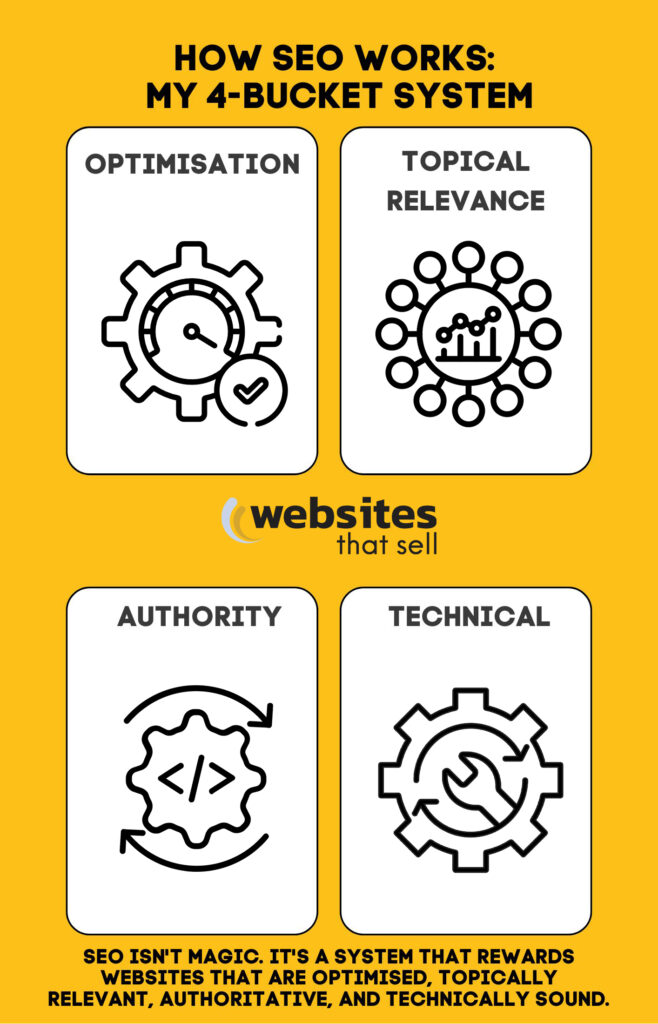This is a condensed snapshot of what 15+ years of experience has taught me about how SEO really works!
In this article, I'm going to explain how SEO works.
I'm going to break this down in the simplest form I know, and I know it's going to land for you... because I've explained this concept to probably around over 300 different clients and prospects over the years.
If you're confused about SEO or don't understand how it works - what I’m about to explain will make it click for you.
What Is Search Engine Optimisation (SEO)?
SEO or Search Engine Optimisation, is the practice of improving a website's visibility in search engines (including: AI Overview, People also ask results or search results etc), and increasing organic (non paid) traffic from search engines. This is achieved by correctly optimising on-page, off page and technical aspects of the website.
Once you know what SEO is... I find my 4-Bucket System has been the easiest way to explain how SEO works.
How SEO Works: My 4-Bucket System

Instead of drowning you in hundreds of SEO ranking factors or giving you a breakdown of Google’s algorithm and ranking systems, this article will explain what I call the four bucket method.
I’ve tested this with hundreds of clients, so it's not just theory.
And here’s the best part.
Once you understand how it works, you can look at the work your SEO agency is doing and figure out if it’s actually going to help you rank on the first page.
Because you’ll know how SEO works and what needs to be done to make SEO work for your website.
So let’s dive in.
Bucket #1: Optimisation
A huge part of SEO is optimising the right page for the right keyword and buyer intent.
In a moment I’ll explain what that actually means.
Bucket #2: Topical Relevance
Most people would say technical and backlinks and all that type of stuff should be next, but I'm going to show you what's most important and what has the biggest kind of initial ranking push - how we rank sites and the way that we roll it out.
That’s why it’s No.2 on my list.
And it’s actually going to make it a lot easier for you to understand how SEO works too.
Bucket #3: Authority Of Your Website
Domain authority authority, site authority, backlinks, I’m going to break down in simple terms what this means and how much it actually matters in the scheme of all things SEO.
Bucket #4: Technical
Technical SEO comes last. Not because it's unimportant, but because it's supporting infrastructure.
They all play a part, but the reason I've set them up like this makes it really easy to understand how SEO works.
Why You Need to Understand These 4 Core Components of SEO
If you're a business owner or marketing manager looking to invest in SEO, or you've got an SEO company you're already working with, you need to understand these basic concepts.
This knowledge lets you judge whether the SEO company you're going to choose - or the company you're working with right now, is actually doing what they need to be doing to move the needle and get your website ranking.
Once you understand how it works, you can look at the work and figure out whether that's contributing to the fact that you're going to rank on the first page.
If the company's not doing the right thing, you will not get the ROI that SEO should give you.
I use my 4 bucket method with every client so they can make an educated decision and keep us accountable as an SEO company to doing SEO the right way.
Don’t overthink SEO.
Too many people make it complicated.
I’m going to keep things super simple.
No technical jargon or anything like that.
This is the simplest way I've been able to condense it down, which just makes it click in people's minds.
They get how SEO works 😉
How SEO Works With Google’s Search Results Page As A Backdrop.
Picture Google's first page.
You have the search bar, maybe some ads, then 10 organic results.
Most people never go past this page.
That's where you need to be.
Everything else doesn't help your business much.
But it’s important to understand that there is the first page and many other pages to understand how SEO works.
So now you know the importance of Google’s SERP let’s dive into how the 4 buckets move rankings along these pages.
Bucket #1 - Optimisation
Let's start with optimisation.
To understand how this part works, try to imagine you’re an electrician operating in Sydney.
That’s the example I’m going to use.
Our keyword that we would try and rank for in this example would be "electrician Sydney."
If that's the main area you're operating in, the first thing that Google will look at is how optimised your website or the page you're trying to rank is.
In this example, it would probably be the website's homepage.
When it comes to optimisation Google wants to know: Is this page actually optimised for "electrician Sydney"?
You’ve got to ask yourself: “If someone needs an electrician in Sydney, does your page clearly show that's what you do?”
Many businesses skip this or do it wrong.
Without proper optimisation, the other buckets don't matter.
Google won't consider you relevant.
This is your foundation.
Everything else builds on this.
We usually focus on 7 main things when it comes to optimisation.
Other SEO’s again make this super technical, but in most markets these 7 factors is all you need to focus on to make SEO work.
They are…
- Domain/URL
- Title Tag
- H tags
- Meta Description
- Content
- Formatting
- Word Count
Focus on the above and you’re going to have a very optimised page and you’ve just ticked off a big chunk of how SEO works.
Bucket #2: Topical Relevance (The Secret Most People Miss)
If you’ve read much about SEO before, you might have been expecting backlinks to be my next bucket.
But once you’ve got your focus page optimised, it won’t be enough, and sending authority to it will eventually give you diminishing returns if you’re not also the authority on the topic you’re trying to rank for.
To make this happen, what we would do is ensure the entire site is honed in on electrician services for Sydney.
This means describing different electrical services, safety tips, emergency advice, local codes, troubleshooting guides etc etc.
Basically, you need to walk the walk, prove that you’re a real electrician, not just someone talking about electricians.
I call this topical relevance.
This is what has the biggest initial ranking push in how we rank sites and is a big piece of the whole Search Engine Optimisation puzzle.
Google is getting smarter.
They want to rank websites that are genuine authorities, not just websites with the right keywords.
If you get your optimisation right, become the topical authority you’ve won half the SEO battle and probably know more about SEO and how it works than most people posing as SEO experts these days…
Bucket #3: Authority of Your Website
This is where backlinks, citations, reviews, and trust signals come in.
Google needs to see that other websites and people consider you credible.
Do other relevant sites link to you?
Do you have good reviews?
Are you mentioned in directories and industry publications?
The way Larry Page & Sergey Brin (founders of Google) came up with this is similar to citations & references in University Essays.
In short, at Uni you can’t just make your argument without any proof.
You are just a student and not a professor.
So to make your argument valid, essays need to have references from other publications & authoritative sources to back up their arguments.
It works exactly the same when it comes to website authority.
The more backlinks and authority sources from around the Internet point to your website, the more authoritative your website is going to be.
Authority takes time to build.
You can't fake it overnight.
While it can come from the work your SEO does, it also comes from doing good work in real life.
Satisfying customers, and engaging with your industry.
And it's crucial for long-term rankings.
It is a big part of how SEO works, and hence has earned a bucket all of its own.
Bucket #4: Technical
While not least important, technical comes last in my framework.
It includes
- site speed
- mobile responsiveness
- proper HTML structure
- Etc
In short… all the behind-the-scenes stuff.
Technical issues can prevent you from ranking.
But fixing them alone won't get you to the first page if you haven't handled the first three buckets.
The way you want to think about technical SEO is like a handbrake on a car.
The car is going to move… but once the handbrake is taken off it’s going to move much much faster and drive exactly the way it was designed to drive.
I’ve seen sites that have bad technical metrics rank.
But I’ve also seen sites jump in rankings dramatically after technical fixes were applied.
Technical SEO is a big part of how SEO works and getting it right will help your site move to that first page of the SERP’s.
Understanding the Levers to Push in Your SEO Campaign
This framework shows you exactly which levers to push in an SEO campaign.
When you understand how each bucket affects how your site ranks the first page of Google, you can:
- Evaluate your current SEO work - Ask your SEO company specific questions about each bucket
- Prioritise your efforts - Focus on optimisation first, then topical relevance, then authority, then technical
- Keep your SEO company accountable - You'll know if they're doing what actually moves the needle
How This Makes SEO Click
I've used this visual explanation with hundreds of clients for over 15 years.
It works because it makes SEO click in people's minds.
They finally get how it works.
Instead of drowning in technical jargon (which we further help you understand here) and the hundreds of ranking factors (some articles say thousands) the internet will throw at you, you can see the clear path from your current position to those 10 spots on Google's first page.
This is how SEO works.
This is how we rank sites.
And this is how you can make sure you're getting real value from your SEO investment.
When you understand these four buckets and can visualise how to actually climb that first page of Google, you're not just hoping your SEO company knows what they're doing.
You can hold them accountable to doing SEO the right way.
Even more so…
Now you can ask your SEO provider specific questions:
"Show me how our pages are optimised for our main keywords."
Ask for specifics, not vague promises.
"What's our content strategy for building topical authority?"
Are they helping you create relevant content or just tweaking meta tags?
"How are you building our website's authority?"
Can they show you quality backlinks and citations?
"What technical issues have you found and fixed?"
How do they monitor your site's technical health?
or
How long will SEO take to work?
These questions will quickly show if your SEO company knows what they're doing and they themselves know how SEO works.
The Bottom Line
SEO isn't magic.
It's a system that rewards websites that are optimised, topically relevant, authoritative, and technically sound.
This framework has been tested with 300 clients over 15 years.
That's real-world proof it works, we use it for all of our clients as part of the SEO services our agency offers.
Focus on optimisation first.
Build topical relevance.
Establish authority.
Fix technical issues.
This is how you get to Google's first page.
It's not easy, but it works.

